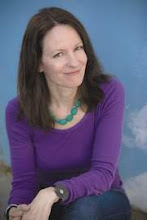...An Interview with the Charlotte Observer's Departing Book Editor
"My job is like being a match maker, only I'm matching books with reviewers."
The Charlotte Observer --that's Charlotte
North Carolina, ya'll--has one of the better
book sections around. Of course, these days, the fact that a daily newspaper still
has a dedicated book page with reviews and literary news (fresh, not canned), and a literary event calendar is impressive.
For several years,
Jeri Krentz, the
Charlotte Observer's Reading Life editor, has been a gre

at champion for readers--and authors. (Case in point. Read her column,
"A Bumper Crop of Good Books Coming in '08"). Alas, she will soon be leaving her position:
"After 27 years at the Observer," she said, "I'm taking a new job. My last day as book editor will be Feb. 22 -- on Feb. 25, I'll start work at the Duke Endowment." Jeri, who has a bachelor's degree in English from Carleton College and a master's degree in journalism from the University of Missouri, has worked at the newspaper since she was 23.
I thought it would be interesting to ask Jeri about her role as book editor of the
Observer, and she graciously agreed to answer my questions.
How and when did you become editor of the Charlotte Observer book section? I came to the Charlotte News as a reporter in 1981, straight out of graduate school. The News merged with the Charlotte Observer in 1983 (I believe). In my 27 years with the paper, I've been a police reporter and beach reporter; I've covered higher education and philanthropy; I've written breaking news stories and features. I became book editor in August 2005 -- but the features department head changed to title to Reading Life Editor to broaden my role. I edit book reviews and create the book page, but I also write a weekly column and write news stories about literacy, authors, library trends, etc.
How do you decide what will be reviewed? Do you plan months in advance?
The Observer receives dozens of galleys and books each week. Someone else unpacks the boxes for me and divides the books into stacks of fiction, nonfiction, mysteries and paperbacks. We devote one page of the Arts section each week to books, which allows room for one lead review, one secondary review and three short reviews (along with my weekly column, a best sellers list and a few other short features). I decide months ahead which books will take that lead review spot. Usually it goes to an important author or title that I know people will want to read about. Sometimes, my reviewers at the local colleges will let me know about a big book in their field. Sometimes, the book has a Carolinas connection.
What catches your eye--what advice would you offer book publicists and authors who hope to have their books reviewed?
Because I want to give my page a local flavor, I'm drawn to a Carolinas connection (the author is coming here for a book signing, for example). It's really pointless for a publicist or author to call and ask me if I've received a galley. There are just too many to keep track of.
What kind of reviewers do you work with generally, and how do you decide which books to assign them?
Most of my reviewers teach at local colleges and universities. Others are North Carolina or South Carolina authors. A few work at the Public Library of Charlotte and Mecklenburg County. My job is like being a match maker, only I'm matching books with reviewers.
Any changes in store for the Observer 's book page?
The Observer is trying to create an extensive online book page with a mix of resources for book clubs, reviews and news.
 Frye boots, a Canon digital camera, a bat house, a blue bird house, and a turtle sculpture. What do they have in common? They're part of the great stuff I got for my birthday. The sculpture, pictured here, is made from recycled parts and a vintage WWII helmet. Our irrationally exuberant bobble-headed terrapin greets guests at our front door...
Frye boots, a Canon digital camera, a bat house, a blue bird house, and a turtle sculpture. What do they have in common? They're part of the great stuff I got for my birthday. The sculpture, pictured here, is made from recycled parts and a vintage WWII helmet. Our irrationally exuberant bobble-headed terrapin greets guests at our front door...


















